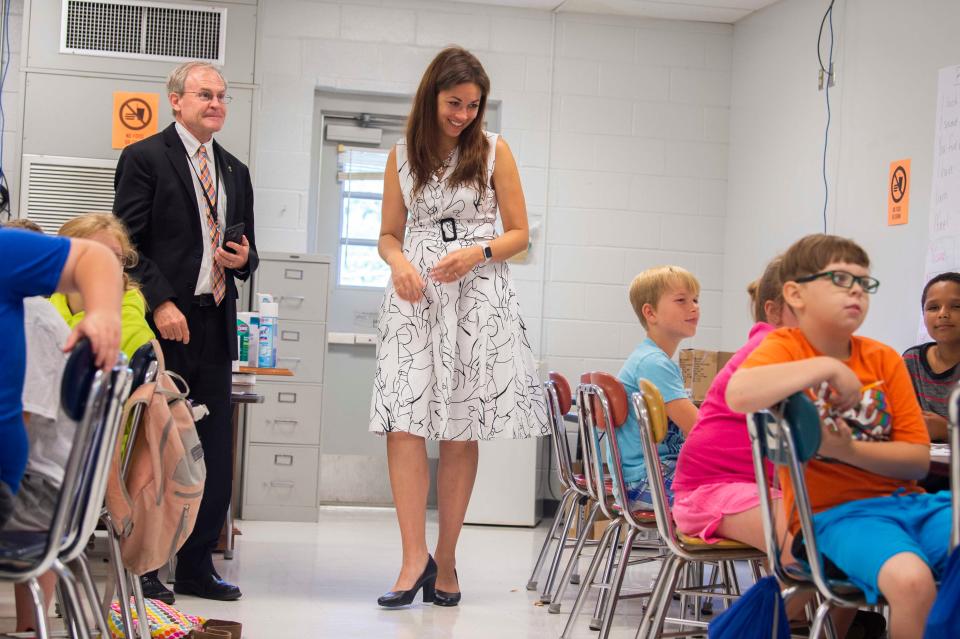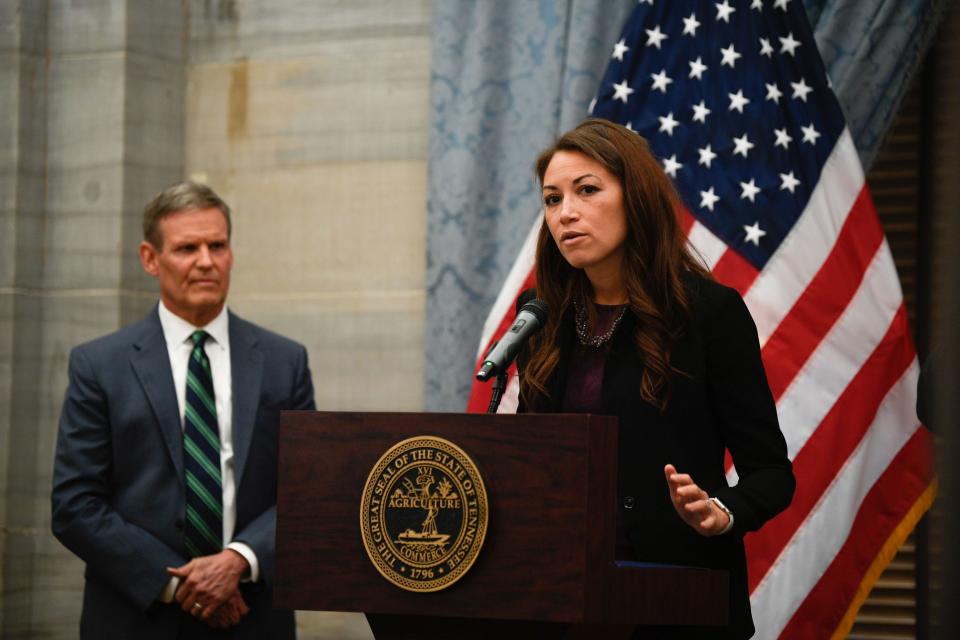Education Commissioner Penny Schwinn to step down; Gov. Lee names school-choice expert to post
- Oops!Something went wrong.Please try again later.
Tennessee Education Commissioner Penny Schwinn, who led the department through the COVID-19 pandemic and oversaw an overhaul of the state’s K-12 funding structure, announced Monday that she will leave the position on June 1.
Schwinn, one of Gov. Bill Lee’s first-term cabinet appointments in 2019, led the state's education department through seismic changes, including school closures and learning loss brought about by the coronavirus pandemic, implementation of a controversial school voucher program, natural disasters like flooding and tornadoes that destroyed school facilities, and the overhaul of the state's education funding formula set to take effect in July.
“My North Star is kids. It has been from day one and it will be for the rest of my career,” Schwinn told The Tennessean in an interview Monday morning. “Whether I'm driving down the road and see a kid in a car or at my kids soccer game or in a Kroger, I know that I'm personally responsible for that child's education and that I take that very seriously.”

Lizzette Gonzalez Reynolds, who currently serves as the vice president of policy at Florida-based ExcelinEd, will take Schwinn's place on July 1, Lee announced in a news release. Reynolds' career "reflects a deep commitment to school choice, assessment and accountability," the governor's office said.
"Lizzette's significant education policy experience and leadership make her well-suited to continue our work to deliver a high-quality education and expand school choice for Tennessee students," Lee said in a statement. "I welcome her to Tennessee and appreciate her service to students, families and teachers across the state."
Funding plan: In win for Gov. Bill Lee, Tennessee lawmakers pass major education funding overhaul
ExcelinEd was founded by then-Florida Gov. Jeb Bush in 2008 and advocates for a wide range of student-centered policies, according to its website. Reynolds, a lifelong Texan, specializes in assessment, accountability and school choice. She previously worked as then-Texas Gov. George W. Bush's deputy legislative director. She also served as chief deputy commissioner for the Texas Education Agency — a role Schwinn took on in 2016 after Reynolds left.
Deputy Commissioner of Operations Sam Pearcy will serve as interim commissioner in June.
While Schwinn did not say where she is going next, she did say she plans to stay in Tennessee.
“I'm going to be cheerleading for the entirety of her time here,” Schwinn said of Reynolds. “There will not be a bigger supporter of her — good days, bad days or otherwise — than me.”
In response to Schwinn's resignation, House Democratic Caucus Chairman John Ray Clemmons, D-Nashville, said her tenure was "defined by a strategic and purposeful scheme to undermine the integrity" of public schools, and "steer precious resources from underfunded schools to private entities."
Clemmons cited the governor's Education Savings Accounts program, charter school expansion, establishment of the state Charter School Commission, the state's funding overhaul for K-12 schools, and the new third grade retention policy.
"Perhaps no administration has done more to harm our schools and students and strategically undermine teachers than Schwinn and Lee," Clemmons said in a statement. "Once we finally get rid of Lee and hopefully elect someone who truly values public education, it will take years to undo the damage these two have intentionally caused to Tennessee’s public education system. Unfortunately, an entire generation of students, including my own children, will have been irreparably and adversely impacted by these conspirators’ immoral motives.”
Of Schwinn's departure, JC Bowman, executive director of Professional Educators of Tennessee, said the group wishes Schwinn well, and "although her accomplishments have been mixed, the results will ultimately be determined over time."
"Governor Lee now has an opportunity to shift the Tennessee Department of Education in a new direction. A new leader needs to look inward, as well as outward," Bowman said in a statement. "The TDOE needs to rebuild and fill critical positions in the Department to serve the needs of parents, pupils, educators, and school districts. Outwardly, the TDOE needs to reconnect with the stakeholders here in Tennessee. We look forward to working with the Lee Administration and the new Commissioner Lizzette Gonzalez Reynolds to continue making Tennessee the best place to raise a family and educate all children.”
Leading through upheaval
Sworn in February 1, 2019, Schwinn has helped lead the state through a global pandemic, flooding and tornadoes and calls for additional school security in the wake of shootings.
"During her years of dedicated service, Penny has played a key role in our administration's work to ensure educational opportunity for Tennessee students and secure the next generation of teachers, while navigating historic learning challenges," Lee said in a statement.
But it all started with upheaval of a different kind: five troubled years of technology and delivery issues with the state's testing system, TNReady.
“The No. 1 thing I was told to do on my first day in this job by the governor and the General Assembly was to get the assessment working and – knock on wood, we’ve still got a couple days more – but that thing is working,” Schwinn said.
During the pandemic, Schwinn led the state's school districts through controversies over school closures and reopening and school mask mandates, a consistent face of the state's response alongside Lee and former Health Commissioner Lisa Piercey.
If given the opportunity to handle pandemic response differently, Schwinn said she would be mindful of communicating with the wide variety of school districts in the state — something she said the department became more focused on later in the pandemic.

"During COVID, it was such a difficult emotional time for everyone and people felt very strongly in whatever they were doing, whatever their belief system was, however they were approaching it," Schwinn said. "I would go to one district, let's say Metro Nashville — very, very different than if I go an hour and a half down the road to Lincoln County. Literally, there wasn't social distancing or masks and it was just two different communities handling something in two different ways."
Schwinn also spoke to the tragedy at the Covenant School in March when a shooter killed three children and three adult staff members. She said she lives in the neighborhood where the private Christian school is located and that her son attends school just a half-mile away.
More: State guidance on masks, virtual learning to schools is confusing. This timeline will help.
“We drop our kids off at school and the biggest promise that we expect is that we get them back at the end of the day,” Schwinn told The Tennessean.
Schwinn said it’s not the first time a school shooting has hit close to home, citing the 2018 school shooting in Santa Fe, Texas, that left 10 dead and 13 injured. She said the commitment to school safety is "very real" among state leaders — especially those who are parents.
“It’s not just an operational challenge, it’s a personal one because we are parents of children, and they are our most precious resource,” Schwinn said. “We should do whatever we can to keep our kids safe.”
She stopped short of detailing how, saying she’s not law enforcement and can’t speak to the issue, but emphasized finding common ground.
“Our common ground is a deep belief in protecting our kids and educating them well, and if we can get to that as the common ground as our purpose forward, we will find the best solutions for Tennessee,” Schwinn said. “That's how we got literacy passed. It's how we got TISA passed. It’s how we do big things.”
Policy changes
During her four years at the helm of the department, Schwinn led the department to significant policy changes, establishing the early literacy-focused Reading 360 program, an apprenticeship program to train new teachers while offering classroom experience, establishing permanent summer school options, and initiating an overhaul of the state's system for funding K-12 education.
“The big things that I'd hoped we'd be able to do as a state we've gotten done faster and at a bigger scale than I had expected,” Schwinn said. “We’ve stayed the course on things like literacy and acceleration and a new school funding formula and an apprenticeship program, and all sorts of wonderful things."

Schwinn said she is proud of what her department, along with districts, teachers, kids and families, have accomplished in the last four years, praising them for navigating complex issues like the pandemic and the politicization of education.
More: Tennessee Supreme Court rules in favor of Gov. Bill Lee's controversial school voucher program
Tennessee schools chief: 'We're in a really difficult time in public education'
Schwinn played a key role in formulating policies after the COVID-19 pandemic to address learning loss and literacy achievement — something she views as a key accomplishment during her tenure.
“I'm really proud of our work of literacy and know that we'll keep our foot on the gas pedal there,” Schwinn said. “It’s so important.”
Work to equip quality teachers, and increase minimum salaries is another highlight, she said, citing the legislature's recent approval of policy to make teacher pay a minimum of $50,000 by 2027.
Tennessee's voucher fight
This year, Schwinn also led the department through implementation of Lee's school voucher program, known as education savings accounts.
The program offers more than $8,000 in state funding to low-income students to attend a non-public school of their choice in Shelby and Davidson counties.
The program was an early legislative win for Lee, seeing narrow approval by the legislature in 2019, but it stalled for several years during lengthy court battles. Beginning last fall, the department was in the clear to implement the program, and so far a few hundred students are enrolled in private schools.
The program remains one of the most controversial education initiatives of the Lee administration, with critics arguing to drains valuable resources away from traditional public schools.
Overseeing implementation of the program this year, Schwinn said the department’s focus is giving parents quality data about the school options available.
“Having a first year pilot implementation, that allowed us to really understand from a parent perspective, how do we give families accurate, good quality information so that they can make the best decision for their kids,” Schwinn said. “It is not about pushing kids into any one type of pathway. It's about saying, if this is an option, we want to make sure parents know all of their options.”
Schwinn said she anticipates more action on school choice in the coming years, noting Reynolds' past work on school choice initiatives.

“She really has a very, very strong, significant background in school choice policy. I think that's one of the things that really spoke to the governor's office,” Schwinn said. “I anticipate that she will really take that school choice platform and that will be one of her big legacies.”
In response to Reynolds' appointment, Sen. Heidi Campbell, D-Nashville, criticized the governor's school choice agenda.
"Gov. Bill Lee wants to end public education as we know it by diverting tax dollars to private academies and his extreme friends who run charters," Campbell told The Tennessean in a text message. "The last commissioner rubber stamped his ideological agenda, and it looks like the new one is ready to double down on these corrupt policies."
Schwinn also oversaw formulation and policy decisions to overhaul the state's funding formula for schools and school districts. In 2021, alongside Schwinn and her team garnered feedback from 18 committees of lawmakers, stakeholders, and school administrators, held town halls across the state, and fielded 1,300 public comments to formulate a school funding policy to replace the state's outdated Basic Education Program funding plan.
“I think our TISA process showed here's what it can look like when you actually want to listen to all stakeholders,” Schwinn said. “It was a fast process, but we brought in so many people – a much more robust policymaking, I think, framework than we've seen before.”
Lawmakers approved the new Tennessee Investment in Student Achievement funding structure in 2022, which assigns a set amount of funding to each child, and additional funding for specific needs. Overall, the state has made 20% more state dollars for public education.
“What I've learned is that when you have more voices, you get to a better outcome,” Schwinn said. “You just have to make sure that you know how to actually include everyone, make sure they're heard, and be very transparent about – these are the non-negotiables and this is the sandbox we're playing in, but let's build the best product for our kids.”
But TISA also has its critics, who say the state still isn't adequately funding K-12 education. The state remains in the bottom in overall K-12 spending per pupil.
This article originally appeared on Nashville Tennessean: Penny Schwinn out as Tennessee Education Commissioner; replacement set

